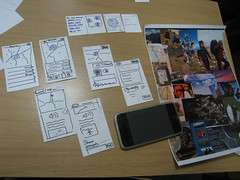Mobile Mountains, Over The Air 2009
The organisers of Over The Air very kindly gave us the opportunity to run our Mobile Mountains workshop again, extended to 2 hours from its normal 90 minute slot.
 If you've missed the previous write-ups, it's a format that Joh and I came up with over the Summer, to help attendees experience, examine and learn from an iterative design process. We get groups of developers and designers working at a furious pace to prototype and user-test a product for a specific persona from scratch. After an initial round of design-and-test we then introduce a significant change and let them evolve their product in a second design iteration. We then help them examine the impact of this change and establish what they learn from dealing with it. This description is deliberately vague - I don't want to give away too many details, given that part of the point is that attendees deal with the unexpected.
If you've missed the previous write-ups, it's a format that Joh and I came up with over the Summer, to help attendees experience, examine and learn from an iterative design process. We get groups of developers and designers working at a furious pace to prototype and user-test a product for a specific persona from scratch. After an initial round of design-and-test we then introduce a significant change and let them evolve their product in a second design iteration. We then help them examine the impact of this change and establish what they learn from dealing with it. This description is deliberately vague - I don't want to give away too many details, given that part of the point is that attendees deal with the unexpected.
This was the largest group of participants we've had for a session; at peak I think we had about 40 or so, divided into 7 groups. Despite this it seemed to go fairly well: every single group had a product to show off by the end of the first 15-minute design session and they were all able to demonstrate they'd learned from the 5-minute user tests.
A 2 hour slot meant that the whole thing felt a little less rushed, but the last few minutes were still a little frantic, as we looked at what lessons groups had learned. A few of the more consistent ones were:
- Working within constraints boosts creativity (this one seems to pop up every time);
- User testing improves the product;
- Basic ideas translate better across a range of form factors than more complicated or "showy" stuff;
- Just getting started on the product was highlighted as difficult by a couple of groups;
 There were a few other insights I found particularly interesting:
There were a few other insights I found particularly interesting:
- Having more voices on a team helped (though it was noted that this probably didn't scale linearly indefinitely);
- Radical changes to the product meant completely scrapping the old version;
- Working with basic devices could lead to better products; one group noted that they had the temptation to over-egg their product when working on technically capable devices;
- One team noted that they spent 80% of their effort on thinking through UI chrome, rather than the product itself;
- Working within constraints let to more passion in the product development - perhaps a sort of "blitz spirit" for design;
Behind the scenes, I had another agenda: this is a great way of introducing developers to a design process and showing the value of paper prototyping or even literally 5 minutes of user testing. It gets even better when there's enough design expertise in the room to embed designers across the teams and get everyone working - and thinking - across disciplines.
Thanks to everyone who attended! Update: one of the attendees has written up their experiences with the workshop here. I'm particularly chuffed with his quote: "being still more of a developer, it was a great session to understand the basic principles of UX and common mistakes made in teams where designers are either neglected, not understood, or even worse, non existent"
Update: slides from the workshop are now online here.